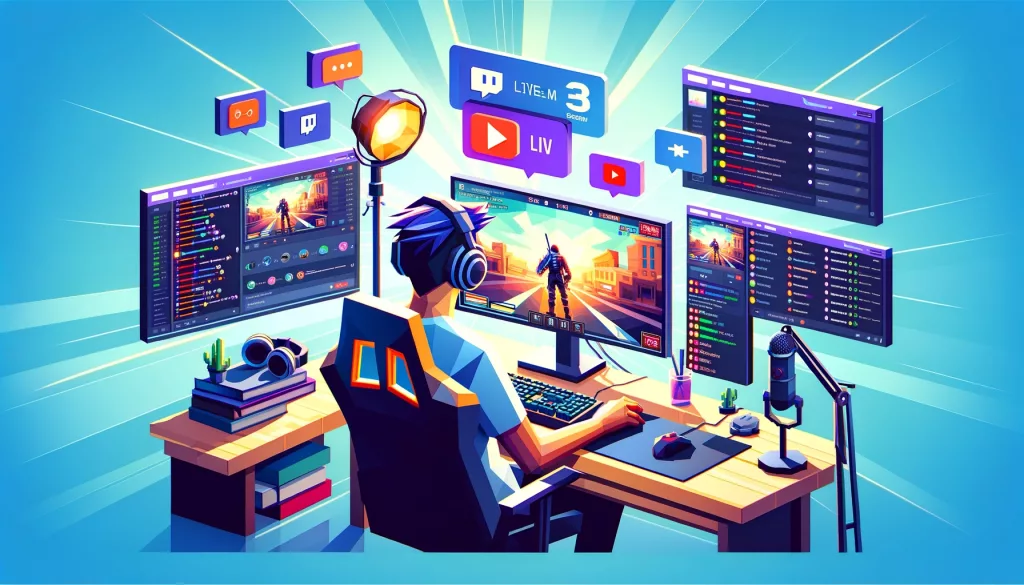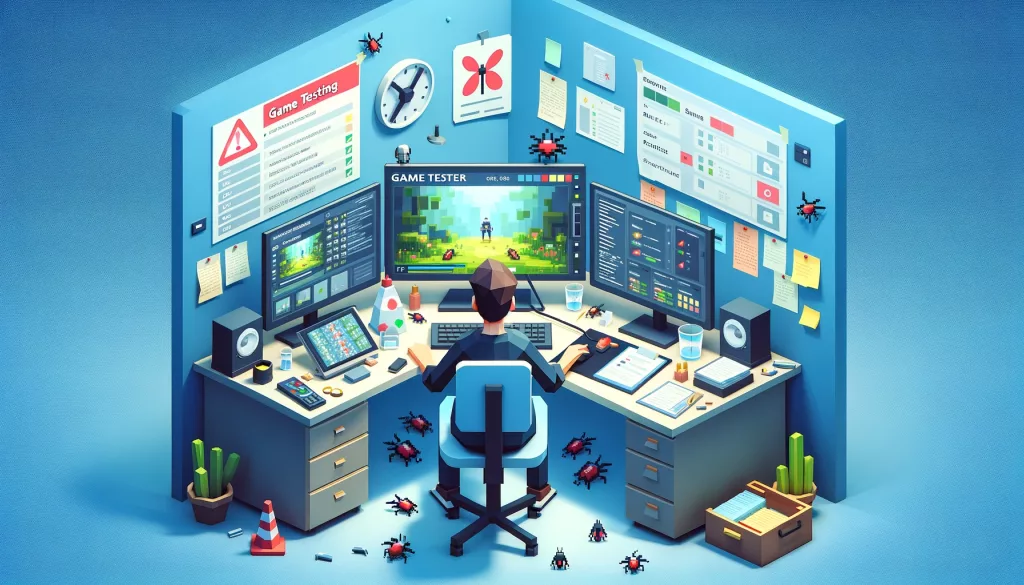In the vast expanse of the digital realm, video gaming has transcended beyond a mere hobby to become a substantial income source for many.
With the industry’s unprecedented growth, opportunities to monetize gaming skills are more abundant and varied than ever before.
This evolution has opened doors for gamers worldwide to not only enjoy their passion but also to profit from it. From competing in high-stakes eSports tournaments to streaming gameplay for a global audience, the avenues to earn through gaming are as diverse as they are lucrative.
This article delves into 16 innovative ways that can help you turn your gaming prowess into financial success. Whether you’re a seasoned gamer looking to leverage your skills or a newcomer eager to explore the monetization landscape of gaming, this guide offers valuable insights into making money playing video games.
Join us as we explore these pathways, providing you with the knowledge to embark on your journey from gaming enthusiast to earning participant in the gaming economy.

Table of Contents
1. Participating in eSports Tournaments
One of the most thrilling ways to make money through video gaming is by participating in eSports tournaments. These competitive events, ranging from local contests to international championships, offer substantial prize pools for the winners and participants. The allure of eSports lies not just in the monetary rewards but also in the recognition and the potential to be scouted by professional teams.
Success in eSports requires a combination of skill, strategic thinking, and the ability to perform under pressure. Gamers who excel in popular titles such as “League of Legends,” “Dota 2,” and “Counter-Strike: Global Offensive” find themselves in a lucrative ecosystem. However, the journey to becoming an eSports competitor is demanding. It involves rigorous training, team coordination, and an understanding of game mechanics at a profound level.
The rise of online platforms has made accessing tournaments more straightforward, allowing gamers from all over the world to compete. Furthermore, with the increasing viewership of eSports events, sponsors and advertisers are keen to invest, making the prize pools even more attractive. For gamers looking to make their mark, eSports tournaments not only offer a path to financial success but also the chance to become a part of gaming history.
To excel in eSports, start by honing your skills in your chosen game, studying strategies, and participating in smaller competitions to build your reputation. Networking with other gamers and joining communities can also provide opportunities and support as you pursue competitive gaming.

2. Streaming on Platforms like Twitch and YouTube
In the era of digital entertainment, streaming has emerged as a powerful medium for gamers to share their passion and expertise with the world. Platforms like Twitch and YouTube have become the stages where gamers can live broadcast their gameplay, engage with a community in real-time, and earn income through various channels.
The journey to becoming a successful streamer involves more than just playing games online. It requires a charismatic personality, the ability to engage and entertain an audience, and a consistent streaming schedule. Streamers make money through viewer subscriptions, donations, advertising revenue, and sponsorships. The more engaging and popular your stream, the higher your potential to attract a sizable audience and, consequently, generate more income.
Building a loyal community is at the heart of successful streaming. Offering unique content, such as game walkthroughs, tips, challenges, or simply showcasing exceptional gaming skills, can help differentiate your channel. Engagement with viewers through chat, collaborations with other streamers, and participation in streaming events are crucial strategies for growth.
To start streaming, you’ll need a decent gaming setup, including a good computer or console, a high-quality webcam, and a microphone. Additionally, understanding the technical aspects of live broadcasting, such as software for streaming and optimizing video quality, is essential.
Streaming can be incredibly rewarding, offering not just a potential income stream but also a platform to express yourself and connect with like-minded individuals globally. Whether you aim to share your gaming experiences, build a community, or educate and entertain, streaming on Twitch and YouTube is a viable avenue for gamers looking to make their mark in the digital world.

3. Creating Gaming Content for YouTube or Blogs
The digital age has ushered in myriad opportunities for gamers to share their knowledge, insights, and experiences with a global audience. Creating content for YouTube or gaming blogs presents an exciting avenue for gamers to delve into the intricacies of their favorite games, offer tutorials, reviews, and much more. This not only allows them to connect with fellow enthusiasts but also to monetize their content through advertising revenue, sponsorships, and affiliate marketing.
The key to success in this domain lies in offering unique, engaging content that adds value to your audience. Whether it’s through deep-diving into game mechanics, offering expert walkthroughs, or providing commentary on the latest gaming news, your content should stand out in a crowded market. Consistency is also crucial; a regular posting schedule keeps your audience engaged and coming back for more.
For those inclined towards writing, gaming blogs offer a platform to articulate well-thought-out opinions, guides, and reviews. These blogs can be monetized through ads, sponsored posts, and affiliate links. On the other hand, YouTube channels cater to those who prefer video content, providing a visual and auditory avenue to share gaming tips, news, and reviews.
Starting a gaming blog or YouTube channel requires an initial investment of time and possibly money, for equipment, in the case of YouTube. However, the potential returns can be significant, not just in monetary terms but also in the form of community building and personal branding.
To enhance your content’s reach, SEO (Search Engine Optimization) plays a vital role. Using the right keywords, creating compelling titles and descriptions, and understanding your audience’s search intent can dramatically increase your visibility online.

4. Game Testing for Developers
Entering the gaming industry as a game tester is a coveted pathway for many gamers, offering a unique opportunity to blend passion with profession. Game testing, often seen as a stepping stone into the gaming world, involves meticulously playing through games in development to identify bugs, glitches, and other issues that could impact user experience. This critical role not only ensures the quality and playability of the final product but also provides testers with firsthand experience in game development.
The responsibilities of a game tester go beyond just playing; they require a keen eye for detail, patience, and a systematic approach to documenting and communicating issues. Testers work closely with developers, providing feedback that is integral to the game’s development process. This collaboration is crucial in refining game mechanics, enhancing storylines, and ensuring the game is accessible and enjoyable for a wide audience.
While game testing can be challenging and sometimes repetitive, it offers invaluable insight into the intricacies of game design and development. For those looking to carve out a career in gaming, it can serve as an educational foundation, offering perspectives on what goes into creating the games they love.
The path to becoming a game tester often begins with a passion for gaming and a keen interest in the development process. Many testers start in entry-level positions, with opportunities to advance as they gain experience. Networking, building a strong portfolio, and continuously learning about the latest gaming trends and technologies can enhance prospects in this dynamic field.
Game testing is not just about playing games; it’s about improving them. It offers a unique blend of challenge, learning, and satisfaction, especially when seeing a game you’ve tested succeed and be enjoyed by others.
5. Professional Coaching for Aspiring Gamers
In the competitive world of gaming, many aspire to improve their skills, climb the rankings, and possibly pursue a career in eSports. This ambition has given rise to a new avenue for making money in the gaming industry: professional coaching. Gamers who excel in their field are finding opportunities to mentor others, sharing strategies, techniques, and insights that can help elevate their gameplay.
Professional gaming coaches offer personalized training sessions, focusing on areas such as game mechanics, strategy development, and mental conditioning. They work with individuals or teams, providing feedback, analyzing gameplay, and setting goals to achieve improvement. This role not only requires a deep understanding of the game but also the ability to teach and motivate.
The demand for gaming coaches has grown significantly with the rise of eSports and competitive gaming. Coaches can monetize their services by offering one-on-one sessions, creating online courses, or through platforms dedicated to connecting coaches with players. The satisfaction of helping others achieve their gaming goals, alongside the financial rewards, makes coaching a fulfilling path for skilled gamers.
To become a professional coach, one must not only be proficient in the game but also possess strong communication skills and a passion for teaching. Building a reputation through competitive achievements, streaming, or content creation can help attract potential clients. As the gaming community continues to grow, the role of a coach becomes increasingly vital, providing a bridge for gamers to reach their full potential.

6. Selling Game Accounts and Rare Items
In the vast ecosystem of online gaming, the trade of game accounts and rare in-game items has become a lucrative market for players looking to monetize their efforts and achievements. This practice spans across various genres, from MMORPGs (Massively Multiplayer Online Role-Playing Games) to competitive online games, where the rarity and level of accounts or items can significantly influence their value.
Marketplaces and Platforms: Several online platforms and forums cater to the buying and selling of game accounts and items. These marketplaces provide a space for gamers to list their accounts for sale, showcasing their achievements, rare items, or high rankings.
The Value of Rarity: The worth of a game account or item often hinges on its rarity, level, or uniqueness. Rare skins, weapons, or characters that are difficult or time-consuming to obtain can fetch high prices. Similarly, accounts with high rankings or special achievements attract buyers looking to advance in the game without spending the time to reach those levels themselves.
Risks and Considerations: It’s important to note that selling game accounts and items can be fraught with risks. Many game developers and platforms have strict policies against this practice, leading to potential account bans if caught. Moreover, the market for game accounts is also vulnerable to scams, necessitating caution and due diligence from both buyers and sellers.
Ethical and Legal Implications: The ethics of selling game accounts and rare items are often debated within the gaming community. While some view it as a legitimate way to recoup investment in a game, others see it as undermining the integrity of the gaming experience. Legal issues can also arise, particularly regarding the ownership and transferability of digital assets.
Building a Reputation: Success in this niche market often depends on building a trustworthy reputation. Sellers who are transparent, reliable, and provide quality accounts or items are more likely to build a loyal customer base and command higher prices.
7. Participating in Affiliate Marketing
Affiliate marketing offers gamers and content creators a compelling avenue to earn income by promoting products or services related to gaming. This method involves partnering with companies or platforms to receive a commission for every sale or action completed through an affiliate link provided by the gamer.
How It Works:
Gamers integrate affiliate links into their content, whether it’s within a YouTube video description, a Twitch stream, or a gaming blog. These links direct the audience to products or services, ranging from gaming equipment and games to subscriptions and software. When a purchase is made through these links, the affiliate earns a commission, which can vary based on the product and the terms of the affiliate program.
Choosing the Right Partners:
Success in affiliate marketing hinges on aligning with brands and products that resonate with your audience. Gamers should choose to promote items they genuinely use or believe in, as authenticity drives engagement and trust among followers.
Strategies for Success:
Effective use of affiliate marketing involves more than just placing links in content. Engaging and informative content that provides value to the audience, such as reviews, tutorials, and how-to guides, can enhance the likelihood of clicks and conversions. Transparency about affiliate partnerships also fosters trust and complies with regulatory requirements.
Diversifying Income:
Affiliate marketing provides a way to diversify income streams, reducing reliance on any single source of revenue. By integrating affiliate marketing with other monetization methods, gamers can create a more stable and sustainable income.
Building and Maintaining Trust:
The foundation of successful affiliate marketing is the relationship between the gamer and their audience. Maintaining transparency, recommending products judiciously, and prioritizing the audience’s interests are crucial for long-term success.

8. Creating and Selling Game Mods or Assets
The gaming industry thrives not just on the games themselves but also on the vibrant community of modders and creators who enhance the gaming experience. Creating and selling game mods or assets presents an exciting opportunity for gamers with a knack for design and development to monetize their skills.
The Art of Modding: Modding involves modifying a game to alter its appearance, gameplay, environment, or characters. These modifications can range from simple tweaks to complete overhauls, introducing new elements or improving on existing ones. The creativity and innovation in modding not only extend the life of a game but also contribute to its community.
Monetizing Mods: While many mods are available for free, there’s a growing market for premium mods and assets. Platforms like Steam Workshop and independent websites allow creators to sell their mods, offering gamers a way to support the modding community while enhancing their gameplay.
Creating Game Assets: Beyond mods, talented artists and designers can create and sell game assets, such as textures, models, and sound effects. These assets are invaluable to game developers looking to enrich their projects. Marketplaces like Unity Asset Store and Unreal Marketplace provide platforms for creators to showcase and sell their work.
Building a Portfolio: Success in selling mods and assets often depends on building a strong portfolio and reputation within the community. High-quality, innovative creations that capture the interest of gamers and developers alike can lead to more sales and opportunities.
Legal Considerations: It’s important to navigate the legal aspects of modding and asset creation carefully. Understanding copyright and intellectual property rights is crucial, as is adhering to the guidelines set by game developers and platforms.
Creating and selling game mods and assets not only offers a way to earn money but also contributes significantly to the gaming ecosystem, fostering a culture of creativity and collaboration.
9. Writing Guides and eBooks
For those with a flair for writing and a deep understanding of gaming, creating guides and eBooks presents a viable avenue to earn income. This approach caters to a wide audience, from casual players seeking to enhance their gameplay to competitive gamers looking to gain an edge over their opponents.
Expert Insight:
The key to successful gaming guides and eBooks lies in offering expert insight that can’t easily be found elsewhere. This could include comprehensive strategies, tips, walkthroughs, and secrets of popular games. The more value you provide, the more likely your work is to be sought after.
Self-Publishing Platforms:
The rise of self-publishing platforms has made it easier than ever to publish and distribute guides and eBooks. Platforms like Amazon Kindle Direct Publishing allow authors to reach a global audience, set their prices, and retain a significant portion of the profits.
Marketing Your Work:
To succeed, authors need to not only create valuable content but also excel at marketing it. This involves leveraging social media, gaming forums, and other online communities to promote your work. Building a strong online presence and engaging with your audience can significantly boost your sales.
Diversifying Content:
While starting with a specific game or topic is a good approach, diversifying your content to cover various games and aspects of gaming can expand your audience. Additionally, offering your guides in different formats, such as written guides, video tutorials, or interactive web content, can appeal to different learning styles and preferences.
Legal Considerations:
It’s important to be mindful of copyright and intellectual property rights when creating and selling gaming guides. Ensure that your work is original and does not infringe on the rights of game developers or publishers.
Writing guides and eBooks is not just about sharing your gaming knowledge; it’s about creating a product that enhances the gaming experience for others. With the right approach, it can be a rewarding way to contribute to the gaming community and earn income.

10. Voice Acting for Games
Voice acting in video games is a dynamic and creative field that offers talented individuals the opportunity to bring characters to life. With the gaming industry’s expansion, the demand for diverse and compelling voice talent has never been higher. This presents a unique opportunity for those with vocal talent to enter the gaming world.
Breaking into Voice Acting:
Starting a career in voice acting requires more than just a good voice. It involves training, practice, and networking. Building a professional portfolio or demo reel showcasing your range and abilities is essential. Many voice actors also work with agents who can help them find opportunities in the gaming industry.
The Role of a Voice Actor:
Voice actors contribute to various aspects of a game, including character dialogue, narration, and even sound effects. The ability to convey emotion, personality, and depth through voice alone is crucial. Voice actors often work closely with directors and sound engineers to ensure their performance aligns with the game’s vision.
Finding Work:
Opportunities for voice acting can be found through casting calls, online platforms, and industry connections. Voice actors may work on a freelance basis, moving from project to project, or secure roles with studios for longer-term projects.
Challenges and Rewards:
While the field is competitive, it can be incredibly rewarding. Voice acting allows for creative expression and the chance to be a part of storytelling in the gaming industry. Successful voice actors can build a diverse portfolio, participate in exciting projects, and even gain recognition within the gaming community.
Continued Learning and Adaptation:
Staying successful in voice acting requires continuous learning and adaptation. Workshops, voice coaching, and staying updated on industry trends can help voice actors improve their craft and adapt to changing demands.
Voice acting in games is not just about lending your voice; it’s about embodying characters and enhancing the player’s experience. It’s a field where creativity, skill, and passion come together to contribute significantly to the gaming world.
11. Developing and Selling Your Own Games
In an era where indie game development has become increasingly accessible, gamers with a passion for creation have the opportunity to develop and sell their own games. This venture not only allows for creative expression but also opens up a pathway to entrepreneurial success within the gaming industry.
Getting Started:
The first step in game development involves learning the necessary skills, which can range from programming and graphic design to storytelling and sound design. Numerous resources, including online courses, tutorials, and community forums, are available to help aspiring developers get started.
Choosing the Right Tools:
Various game development engines and tools cater to different needs and skill levels. Platforms like Unity, Unreal Engine, and Godot offer powerful capabilities for game creation, with many offering free versions to get started.
Design and Development:
Developing a game requires careful planning, from conceptualizing the idea to designing gameplay mechanics and creating assets. It’s a process that often involves iteration, testing, and refinement to ensure the game is engaging and enjoyable.
Publishing and Marketing:
Once your game is ready, publishing it on platforms like Steam, itch.io, or the App Store can get it into the hands of players. Effective marketing, through social media, gaming communities, and press releases, is crucial to attract attention and drive sales.
Monetization Strategies:
There are various ways to monetize a game, including direct sales, in-game purchases, advertising, and crowdfunding. Choosing the right strategy depends on your game’s nature and your target audience.
Community Engagement:
Building a community around your game can provide valuable feedback, foster player loyalty, and help spread the word. Engaging with players through forums, social media, and in-game events can enhance the gaming experience and support your game’s growth.
Developing and selling your own game is a challenging yet rewarding journey that can turn a passion for gaming into a viable career. It’s an opportunity to bring your unique vision to life and share it with the gaming world.

12. Offering Technical Support Services
For technically savvy gamers who enjoy troubleshooting and helping others, offering technical support services for gaming hardware and software can be a lucrative endeavor. This role involves assisting gamers in resolving issues related to their gaming setups, software problems, or optimizing performance for a better gaming experience.
Skills and Knowledge:
A deep understanding of computer hardware, software, and networking is essential for providing technical support. Familiarity with common gaming platforms, operating systems, and troubleshooting methods will enable you to offer valuable assistance.
Setting Up Services:
You can offer technical support services independently, through a website or social media, or collaborate with gaming communities and forums. Another avenue is working with companies that specialize in tech support for gamers.
Service Offerings:
Services can range from helping gamers set up their gaming rigs, optimizing software settings for performance, to troubleshooting and fixing complex hardware issues. You can also offer personalized consultations for building custom PCs or creating optimal gaming environments.
Building Trust:
Establishing trust with your clients is crucial. Providing reliable, knowledgeable, and timely support will help you build a positive reputation. Encouraging reviews and testimonials from satisfied customers can also attract more business.
Continuous Learning:
The tech field is constantly evolving, especially within gaming. Staying updated with the latest gaming hardware, software updates, and troubleshooting techniques is vital for providing the best service possible.
Offering technical support services not only allows you to monetize your technical skills but also contributes positively to the gaming community by enhancing gamers’ experiences.
13. Hosting Gaming Podcasts or Shows
For gaming enthusiasts with a knack for communication, hosting gaming podcasts or online shows presents an exciting avenue to share their passion while earning income. This platform allows hosts to dive deep into the gaming world, covering everything from game reviews and industry news to developer interviews and community discussions.
Creating Engaging Content:
The success of a podcast or show hinges on its ability to engage and entertain the audience. Focus on creating content that resonates with your target listeners, whether it’s providing insightful analysis, sharing the latest gaming trends, or offering a platform for community voices.
Building an Audience:
Growing a loyal listener base requires consistency, quality, and engagement. Utilize social media, gaming forums, and collaboration with other content creators to promote your podcast or show. Engaging with your audience through comments, social media, and live interactions can also foster a strong community around your content.
Monetization Strategies:
There are several ways to monetize a gaming podcast or show. Sponsorships from gaming brands or related companies can provide direct income in exchange for ad spots or product mentions. Advertising platforms like Google AdSense or podcast networks offer another revenue stream based on listener numbers. Additionally, listener support platforms like Patreon allow fans to financially support your content directly, often in exchange for exclusive perks or content.
Technical Considerations:
Starting a podcast or show requires some initial setup, including quality recording equipment, editing software, and a hosting platform. While the initial investment can vary, there are budget-friendly options available that can yield professional-quality results.
Staying Current:
The gaming industry moves quickly, so staying informed and current on the latest news and trends is crucial. This not only ensures your content is relevant but also positions you as a credible and authoritative source in the gaming community.
Hosting gaming podcasts or shows offers a unique blend of entertainment, community, and monetization. It’s a platform that allows creators to share their love for gaming, engage with like-minded individuals, and build a brand within the vibrant gaming community.

14. Competing in Online Casino Games
The world of online casino games offers a unique blend of skill, strategy, and luck, opening up opportunities for those looking to monetize their gaming abilities. While the prospect of earning through online casinos can be enticing, it’s essential to approach this avenue with a well-informed mindset and a clear understanding of the risks and legalities involved. This is not investment advise, play at your own risk.
Understanding the Landscape:
Before diving into online casino games, familiarize yourself with the legal landscape in your region. Online gambling laws vary significantly from one jurisdiction to another, and it’s crucial to ensure that participation is legal and regulated in your area.
Choosing the Right Platforms:
Not all online casinos are created equal. Look for reputable platforms that are licensed and regulated, offer fair play, and have positive reviews from other players. Security, customer support, and the variety of games offered are also important factors to consider.
Skill and Strategy:
While luck plays a significant role in casino games, developing skills in certain games can increase your chances of winning. Games like poker, where strategy and skill are paramount, can be particularly lucrative for skilled players. Educating yourself on game mechanics, strategies, and probability can give you an edge.
Bankroll Management:
Effective bankroll management is crucial in gambling. Set clear limits for how much you’re willing to spend and stick to them. It’s important to gamble responsibly and never risk more than you can afford to lose.
The Psychological Aspect:
The highs and lows of gambling can be emotionally taxing. Understanding the psychological aspect of gambling, including the risks of addiction, is vital. Ensure you have a healthy relationship with gambling and seek help if you find it becoming a problem.
Diversification and Professionalism:
Some individuals manage to turn online casino gaming into a professional endeavor, participating in tournaments and competitions. However, diversification of income sources and maintaining a professional attitude towards winnings and losses are essential for sustainability.
Competing in online casino games can be a way to monetize gaming skills, but it comes with its set of challenges and risks. Approaching this path with caution, a well-thought-out strategy, and respect for the legal and psychological implications is essential for anyone considering this avenue.
15. Writing for Gaming Publications or Websites
For gamers with a passion for writing and a deep well of gaming knowledge, contributing to gaming publications, websites, and blogs presents a fruitful opportunity to monetize their expertise. This path allows individuals to delve into the heart of the gaming community, sharing insights, critiques, and the latest news with a wider audience, all while earning income.
Developing Your Niche:
Successful writers often carve out a specific niche within the gaming world. Whether your strength lies in in-depth reviews, comprehensive guides, eSports coverage, or industry analysis, specializing can help set you apart in a crowded market.
Building a Portfolio:
Starting with a strong portfolio is crucial. Create a personal blog or contribute guest posts to established gaming sites to showcase your writing style, expertise, and ability to engage readers. A well-crafted portfolio attracts the attention of editors and publications.
Pitching to Publications:
Once you’ve honed your skills and built a portfolio, the next step is to pitch article ideas to gaming websites and magazines. Tailor each pitch to the publication’s audience and content style, and be persistent. Rejection is a part of the process, but persistence can pay off.
Freelance Writing Opportunities:
Many gaming sites hire freelance writers to cover various topics. These positions may offer per-article payments or ongoing contracts. Networking, attending gaming conventions, and active participation in gaming forums can open up freelance opportunities.
Monetization and Rates:
Freelance writers can negotiate their rates based on experience, the complexity of the topic, and the length of the article. Establishing a rate for your work is important, and as you gain experience and recognition, you can command higher fees.
Staying Informed and Current:
The gaming industry is fast-paced and ever-changing. Staying informed about the latest games, trends, and industry news is essential for producing relevant and engaging content. Continuous learning and adaptability are key to maintaining relevance in the field.
Writing for gaming publications offers a way to combine a love for gaming with a talent for writing, providing valuable content to the gaming community while earning income. It’s a path that requires dedication, quality writing, and a deep understanding of both games and the gamers who play them.
In Conclusion:
As we conclude our exploration of monetizing gaming skills and passions, it’s evident that the gaming industry offers a plethora of opportunities for gamers to transform their hobby into a lucrative career. From competing in eSports tournaments to streaming, developing games, and even writing for gaming publications, each avenue provides a unique way to engage with the gaming community and earn income.
The key to success in these endeavors lies in leveraging your unique skills and interests, being persistent, and continuously adapting to the evolving landscape of the gaming world. Whether through technical support services, voice acting, or hosting gaming podcasts, the possibilities are vast and varied.
As we’ve discussed, it’s crucial to approach these opportunities with professionalism, dedication, and an understanding of the associated risks and legalities. Building a strong personal brand, engaging with the community, and offering high-quality, valuable content can set you apart in a competitive field.
The gaming industry’s dynamic nature requires a commitment to continuous learning and improvement. Staying informed about the latest trends, technologies, and community preferences will help you remain relevant and successful.
In summary, monetizing gaming skills and passions is not only about earning income; it’s about contributing to the gaming culture, sharing your expertise, and making a positive impact on the industry. With the right approach and mindset, the world of gaming offers endless possibilities for creative and ambitious individuals to carve out their niche and achieve professional fulfillment.
As we wrap up this comprehensive guide, remember that the journey to monetizing your gaming skills is unique to each individual. Explore, experiment, and find the path that best suits your talents and passions. The gaming world is vast, and your contribution can make a significant difference.
If you have any more questions, need further guidance, or wish to delve deeper into any of the topics we’ve covered, feel free to reach out. The journey into the gaming industry is as exciting as it is challenging, and your next big opportunity could be just around the corner.


